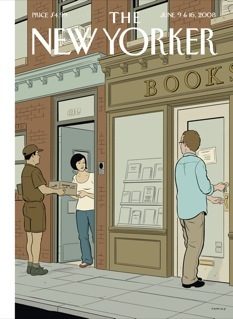 Illustration at left is a recent (June 9-16) cover of The New Yorker by graphic novelist Adrian Tomaine. Her cartoon is entitled “The Booklovers” and illustrates a bookstore owner/employee opening the bookstore and glancing off to the side at his next door neighbor as she is receiving a package from amazon.com (which may be hard to read from the smallness of this scan) – there is also a slightly pained look of guilt on the neighbor’s face who probably realizes this awkward moment and the damage inflicted on her neighbor.
Illustration at left is a recent (June 9-16) cover of The New Yorker by graphic novelist Adrian Tomaine. Her cartoon is entitled “The Booklovers” and illustrates a bookstore owner/employee opening the bookstore and glancing off to the side at his next door neighbor as she is receiving a package from amazon.com (which may be hard to read from the smallness of this scan) – there is also a slightly pained look of guilt on the neighbor’s face who probably realizes this awkward moment and the damage inflicted on her neighbor.
The introduction of the Kindle device by Amazon CEO Jeff Bezos was a recent front cover Time and Newsweek tech/gadget sensation both magazines were fast to fawn over. “But if all goes well for Amazon, several years from now we’ll see revamped Kindles, equipped with color screens and other features, selling for much less. And physical bookstores, like the shuttered Tower Records of today, will be lonelier places, as digital reading thrusts us into an exciting—and jarring—post-Gutenberg era.” Steven Levy, “The Future of Reading” Newsweek
A recent interview with Bezos describes the various faults of reading old fashioned books like “hand fatigue” and the obnoxious “loud” sounds of turning pages. But what about the offensive odor of books, their bulky size and the ridiculous space they consume? I’m sure there are many more shortcomings we could pin on the book. Maybe they are just too difficult to read in this day and age. Who needs ’em? — but before we put this “old mare” to sleep, lets read some more words of wisdom from Bezos the great early champion of the book, who recently said, “In some ways the Web is the most important book in the world”.
MR. BEZOS: “Over some time horizon, books will be read on electronic devices. Physical books won’t completely go away, just as horses haven’t completely gone away. But there is no sinecure for any technology. If you think about books, it’s astonishing. It’s very hard to find a technology that has remained in mostly the same form for 500 years. And anything that has stubbornly resisted improvement for 500 years is going to be hard to improve.
I’m sure people love their horses, too. But you’re not going to keep riding your horse to work just because you love your horse. It’s our job to build something that is better than a physical book. The reason we love physical books is because we have had so many great experiences with that object in our hands that we have nice associations with it.
That is what we’re trying to do with Kindle. We see this as an effort to improve upon the book, even though it’s resisted change for 500 years….
Sometimes big, heavy hardcover books do break you out of the flow because you get hand fatigue. Or turning pages can be loud if you have a spouse sleeping next to you. There are things about physical books that we’re accustomed to but that actually aren’t very good….
The big whopper is wireless delivery of books in less than 60 seconds. You don’t have the cognitive overhead of thinking about your monthly wireless bill. You don’t have to know who the wireless carrier is. We’re hiding all of that complexity.” Jeff Bezos source: “The Way We Read,” The Wall Street JournalÂ
“One, a robot may not injure a human being, or through inaction, allow a human being to come to harm; Two, a robot must obey the orders given it by human beings except where such orders would conflict with the First Law; Three, a robot must protect its own existence as long as such protection does not conflict with the First or Second Laws.” — Isaac Asimov, “Law of Robotics” from I, Robot
In a land where “books are like horses” perhaps people themselves have gone the way of the buggy whip. Perhaps every one of us might be better off replaced by technology. Please consider that the next time you “Buy now with 1- Click.” — but how strange it is (at least for me) that after 500 years the physical book still commands a mystery, respect, love and attraction that cannot be compared to any electronic simulation. Kindle that.
One last consideration: The recent closing of Manhattan’s Mercantile Library raised an interesting article on the value of “literary spaces” and how they function in our lives. “By nature of its inherent privacy, literacy is one of the cultural practices most insulated from the vagaries of fashion. It takes years to write a book, and sometimes weeks to read one, and this acts as a check on the hype cycle. To put it another way, literature and real estate trade on different notions of “vitality.” Spaces where readers and writers can congregate help bridge the divide between the two, literalizing an otherwise imaginary community; the quality of that community will, perforce, inform the quality of the work written for it. And so literary spaces are worth protecting.” — Gart Risk Hallberg, “The Life and Death of Literary Spaces” The Millions Blog, June 10, 2008
